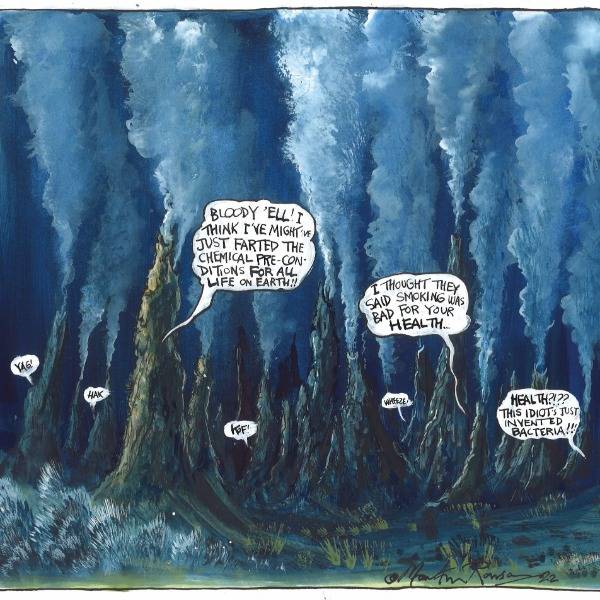
This article is a preview from the Autumn 2018 edition of New Humanist
As measured by Google Trends, interest in the #DeleteFacebook hashtag peaked on 18 March, the day after the Cambridge Analytica scandal was broken by the Observer and the New York Times, and dissipated almost entirely by the end of April. It is difficult to estimate what proportion of active users actually abandoned the platform during those six weeks. Ultimately, only Facebook knows the answer, which is to be measured not just by the number of people who bothered to go through the complex deactivation process, but also by accounting for those who may have simply stopped visiting the website or clicking on the app.
It is not necessary to revisit the scandal in any great detail, except to say that its specific import was almost certainly overstated. Cambridge Analytica is the political consultancy outfit that received leaked data of about 50 million US Facebook users, through a secret agreement with the makers of the “This Is Your Digital Life” app. The company had every interest in claiming to have been instrumental in Trump’s electoral victory, but there is no evidence that this is true. Besides, the campaign for the re-election of Barack Obama in 2012 made similar use of a larger set of data, only to be praised for its “micro-targeting” brilliance. What might in fact have swung the election for Trump is the fact that – commanding as it did a smaller budget than his rival’s – his campaign chose to invest it in Facebook ads in key swing states, while Clinton spent massively on more traditional electronic and print media.
Trump’s was both a victory through Facebook and a victory for Facebook, but this has little to do with Cambridge Analytica or the data leak. It speaks, rather, of the platform’s ability to reach users cheaply and effectively, tailoring different messages to a virtually limitless number of different audiences: almost as many, in this example, as there are US voters.
Both This Is Your Digital Life – a seemingly innocuous personality test – and the more transparent data-harvesting tool used by the Obama campaign exploited a key feature of Facebook apps: their ability to obtain information not only about the users who signed up to them, but also about their Facebook friends. This is how the 300,000 users of This Is Your Digital Life opened the door to 50 million user profiles. The Obama for America app was downloaded by one million people, and the number of users who unlocked their friends list to the campaign is likely to have been roughly proportional. Users of the platform are responsible for protecting not just their own privacy – by operating a byzantine and ever-changing set of parameters – but also the privacy of the people they associate with. Conversely, users who never sign up to dodgy “services” can be targeted without ever knowing why – or even that it’s happening at all. This isn’t a bug. It is central to the value Facebook offers to its actual customers: marketers.
#DeleteFacebook, then, is a call to action that would seem to apply beyond the specific circumstances that triggered the hashtag. No doubt there will be other revelations in the months and years to come that give it new momentum. If our behaviour on Facebook threatens not just our privacy but also the privacy of others, and there is no way to neutralise or limit this harm, then withdrawing from the platform could be presented as a moral obligation for the individual. But what would this achieve in a collective sense? What is the political value, if any, of an orchestrated campaign to overthrow or reform Facebook?
* * *
Before trying to answer this question, I want to note that movements such as #DeleteFacebook intersect with another strand of discourse that has developed over the last decade, and which can be grouped under what critic Nathan Jurgenson has called “disconnectionism”. Disconnectionists advocate various strategies and practices aimed at limiting the time they spend online, and reconnecting (a pun apparently intended) with a more “authentic” level of everyday experience: chiefly, “real” interactions with “real” people. At the cost of reducing this movement to its frequent descents into self-caricature, here’s a quote from a typical disconnectionist handbook, Orianna Fielding’s The Essential Digital Detox Plan:
Really being present meant connecting with the seasons, learning the names of the different winds, recognising the cycles of the moon and reading the ever-changing personality of the sea. Ultimately I learnt how to “be” by going to local farmers’ markets. There I learnt to appreciate the beauty of imperfection, the splendour of a misshapen tomato, appreciating the real meaning of “slow”. I had to learn a new rhythm, one without a preset time limit for everything. Where queuing for 20 minutes to buy some fruit was “just how it was” because everyone in the queue spoke to each other and wanted to share their stories. It was there, waiting to buy my imperfectly shaped, local, seasonal produce, that I began to really connect with where I was and learn to appreciate all the moments and experiences that really matter.
As you can glimpse from this brief passage, disconnectionists repackage current anxieties about the pervasiveness of digital networks into a deeply nostalgic if not downright reactionary recipe for living. Few people can in fact afford to shop at farmers’ markets or find the time to marvel at the splendour of a misshapen tomato. Permanent or quasi-permanent connection isn’t just a lifestyle choice, but also a demand placed by capital upon an increasingly precarious workforce. Pathologising digital connection amounts to blaming individuals for responding to very concrete and often inescapable pressures.
We may also question – as Jurgenson has – the proposition that online social interactions are inherently less “real” than offline social interactions, or that a life lived offline is necessarily more authentic. However, this is precisely where the current critique of platforms such as Facebook resonates with the arguments of disconnectionists.
The problem with Facebook isn’t that it shifts the social exchange online but rather that it degrades the social exchange, by subsuming it to the company’s paramount goal of extracting economic value from our social interactions. Because of the various ways in which the pursuit of this goal has shaped the platform, it can be easy for critics to describe the time we spend on Facebook as not having any social or moral value. And as platforms such as Facebook have become increasingly synonymous with the internet, this critique can legitimately be broadened to the fact of being online at all. So, when Jurgenson charges that disconnectionism is a strategy that negates the emancipatory potential of cyberspace, the person longing for a digital detox can quite justifiably ask: “And what potential would that be, exactly?”
Browsing books about the internet can be a bleak experience. It seems that the only authors harbouring any residual optimism about the present and future of the network are marketing gurus. Largely gone from the shelves are the visions of the dawn of a new collective intelligence articulated by the likes of Pierre Lévy, who in 1997 called the task of imagining, building an enhancing an ever-changing cyberspace “the major architectural project of the 21st century”. These books have been replaced by digital detox guides and a new wave of criticism of the most pernicious effects of the networked society as it is currently configured – such as that it is making us stupid (Nicholas Carr) or uncreative (Jaron Lanier) or dangerously disconnected from one another (Siva Vaidhyanathan).
* * *
So, what happened to the promise of the internet after the 1990s? The shortest answer is: capitalism. The idea of the digital commons, like the principle of net neutrality, was always going to come crashing against capital’s ability to muster common resources for the pursuit of private profit. Enter what is sometimes referred to as “platform capitalism”, of which Facebook is one of the principal exponents along with fellow behemoths such as Google,
Airbnb, Amazon, Alibaba. These massive companies don’t make anything but have collectively eclipsed former
giants of the manufacturing sector. This is in spite of the fact that few people could easily describe what they do. As Leif Weatherby has written:
Companies such as Alphabet [ie Google], with a market cap in the neighborhood of three quarters of a trillion dollars, have claimed to be neutral arbiters and spaces of informational exchange. No one really believes that anymore, but we lack language to grasp the way these platforms collapse profit and the social, culture and capital.
“Surveillance capitalism” is another phrase used to describe the way Facebook and Google in particular operate, as they seek to translate the social behaviour of internet users into a predictive model of their purchasing habits, so that advertisers can better anticipate and target their consumer needs. The dream is to show you an ad for a car or a pair of jeans just as you’re about to decide which car or pair of jeans to buy.
Here’s a real-life example of how the system works in practice. I took my 10-year-old son on a trip to Europe this year. I booked apartments with Airbnb in London and Milan, but for single-night trips – for instance to Florence – I booked a hotel room through Booking.com. Since I did this months in advance, I chose the option that would allow me to cancel my room free of charge up to 24 hours before the date of arrival, in case our plans should change.
From the time I made that booking until we went on our trip, every time I opened Facebook on my mobile I saw ads for Airbnb properties in Florence costing less than our hotel (subtly, the caption for these ads was “a house in Florence on Airbnb for less than the cost of a hotel”). In order for this to have happened, Facebook must have a) known that I booked two properties through Airbnb and b) recorded my session on Bookings.com. This would have c) triggered the sale of the information to Airbnb, so the company could in turn d) place a series of very cheap ads on Facebook to persuade me to cancel my hotel room in Florence. This, no doubt, is what Mark Zuckerberg means when he describes Facebook’s mission as “bringing the world together”.
In this essay, I have used Facebook as shorthand for the state of the internet today. The equivalence, of course, is highly questionable: Facebook could be regarded as representative of the field of social media at best, which hardly encompasses the amorphous mesh of networks and protocols we commonly call the internet. Wikipedia offers a good counter-example to the extraction of private profit from the social exchange, and a stubbornly idealistic model for the kind of knowledge-sharing that was commonly fantasised about in the early years of the web. But, politically, it is with the power of Facebook that we must reckon. Not just in the Western world, where it has reached saturation levels, but also in the developing world, where it is often said that its next billion users will come from.
* * *
As originally reported by Leo Mirani in 2015, there are indications that millions of users in parts of Africa and Asia already consider Facebook the same thing as the internet. This is likely due in part to the efforts of Internet.org, an organisation that lobbies governments and telcos to allow it to run their data infrastructure, with the stated aim of “bringing the internet to the two thirds of the world’s population that doesn’t have it”. Internet.org is very much an arm of Facebook, and is openly branded on the social network itself as “Internet.org by Facebook”. The organisation invests in infrastructure and then offers an app that allows users to access a handful of online services with no data charges. The two main services in question are of course Facebook and its stand-alone Messenger app – almost everything else requires signing up to a paid data plan.
One of the slogans of Internet.org is “Every one of us. Everywhere. Connected”. The organisation has launched its “free basics” service in 23 countries to date, including India, Egypt and South Africa. Google has its own parallel initiative – the Google Free Zone – but it has had nowhere near the same levels of buy-in and success.
How would the user of a free basic service go about “deleting Facebook”, exactly? And if they cannot, what does it mean for citizens of more affluent countries to exercise their freedom to do so? For many of them, it is a limited freedom anyway, as more and more employers reportedly regard the failure to be on Facebook as an element of concern when interviewing candidates – to say nothing of the many workplaces in which having a Facebook presence is an actual requirement. Facebook has insinuated itself in the body social to an extent that makes it immune to individual acts of withdrawal and defiance. Against its hegemonic status, these are little more than moral whimpers.
“Every one of us. Everywhere. Connected.” This brazenly totalitarian slogan invites us to view Facebook not just as a particularly successful inflection of what Mark Fisher called capitalist realism, but rather as a manifestation of the Capitalist Real itself: a virtual yet all-too-concrete world in which every social interaction feeds directly into myriad micro-transactions between participating businesses and the owners of the platform. This poses questions that need to be urgently elevated from the personal to the political.
One possible course of action is regulation. On this front, I favour the splitting of Facebook’s immensely valuable database from its user interface. Imagine if all 2.2 billion monthly active users of the platform could talk to each other through a client of their choice: some for profit, some not, some ad-free, some not, each with their particular mission and focus. The danger of creating different classes of users notwithstanding, it’s a solution that could allow us to carve civic spaces out of Facebook’s hyper-commercialised real estate. It would also require significant political will and might to enforce.
I also agree with Leif Weatherby that “we don’t just need regulation: we need theory”. The internet has changed at a pace and in ways that have outstripped our collective capacity for analysis, and you cannot change or reform what you cannot name. This is a political project, for it requires resources, resolve and a shared sense of what is at stake.
It makes little sense to delete Facebook and walk away from one of the principal mediums for the dissemination of information about the world. We must understand and challenge its power instead.

